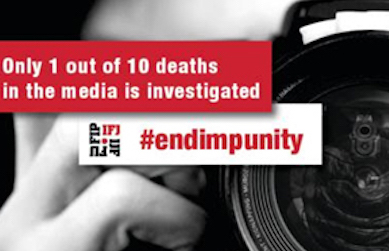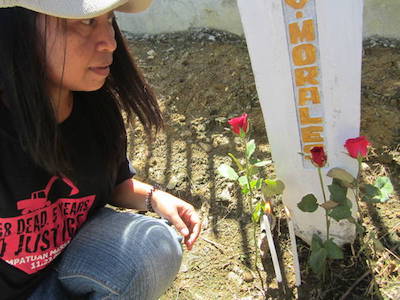
SYDNEY (International Federation of Journalists / Pacific Media Watch): The International Federation of Journalists (IFJ) Asia-Pacific, in coordination with its affiliates launched the three-week End Impunity Campaign for attacks against media workers.
On their website, the federation stated that the campaign is aimed at “reminding the world that journalists do matter. They have families who love them, they are mums and dads, ordinary people; all carrying out the important and increasingly dangerous duty to keep society informed. But for every reporter threatened, for every life extinguished, democracy also suffers the ultimate price.”
In the Asia-Pacific region in 2014, 39 journalists lost their lives in the line of duty, accounting for nearly a third of all journalists killed around the world. According to the IFJ’s killed list, 26 journalists and media workers have already been killed, including seven in the Philippines in 2015.
IFJ’s strategy
The campaign focuses on India, Pakistan and the Philippines, where government authorities have consistently failed to display a genuine commitment to ending impunity and bring perpetrators and masterminds to justice.
These countries remain the deadliest and most dangerous for journalists across the Asia-Pacific region.
The campaign is split into three parts:
Week 1 of the campaign seeks to call the governments of India, Pakistan and the Philippines to account through a letter campaign, demanding action be taken to end impunity.
Week 2 will feature the launch of Without a Trace: Media workers missing in the Asia-Pacific, an online resource of key cases of media workers who have disappeared and remain missing.
Week 3 will focus on the Philippines which remains one of the world’s worst impunity havens for attacks against media workers, following the 2009 Ampatuan massacre and an ongoing, high levels of targeted killings annually.
The IFJ campaign will also call on the governments of Cambodia, Nepal and Thailand to respond to the UNESCO Director General’s report The Safety of Journalists and the Danger of Impunity, which they have so far failed to do.

Journalist killings
The campaign launched November 2, the UN International Day to End Impunity for Crimes Against Journalists, and will run until November 23, the sixth anniversary of the Ampatuan Massacre in the Philippines.
The mass murder in the Phillipines saw 32 journalists, among 58 people brutally killed while travelling in a political convoy in Maguindanao in Southern Philippines. The massacre remains the single deadliest attack on journalists in history, and to date not one conviction has been secured.
Social media action will also be a major component of the campaign including a targeted campaign featuring political leaders of countries where impunity is rife, along with the hashtags #whatareyoudoing? and #EndImpunity.
Globally, the IFJ invites everyone opposed to impunity for journalist attacks to join their social media campaign by sharing images and campaign materials on Twitter, Facebook and Instagram.
IFJ Asia-Pacific stated:
“Impunity not only denies justice to victims and their families, but also emboldens tyrants who quash dissenting voices without fear of reprisal. Bringing an end to impunity is possible and would deliver long-awaited justice to victims and their families and protect the media as a whole.”
This work is licensed under a Creative Commons Attribution-NonCommercial 3.0 New Zealand Licence.




